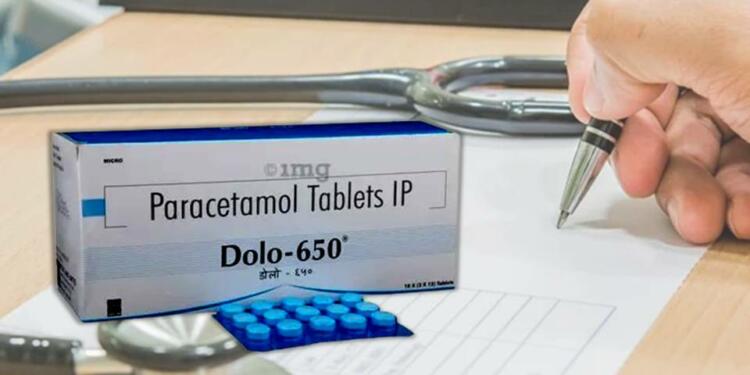Doctors are placed at second position after Bhagwan. After all, if Bhagwan gives life, Doctors preserve it. But, this narrative is taking a different turn in the 21st century. They are often accused of taking bribes. In fact, most of the time, the bribe in question just turns out to be the tip of the iceberg.
Dolo’s future dwindling
Dolo, one of the hot favourites of Indians, is somehow crushing the goodwill built around the brand. The Central Board of Direct Taxes has alleged that makers of Dolo-650 tablets used fraudulent means to sell their products. Apparently, bribes worth Rs 1,000 crores were put into Doctors’ bourses to recommend it. The bribes were sent in cash as well as in the form of travel expenses, perquisites, and gifts to doctors and medical professionals.
Doctors seem to have repaid Micro Labs Ltd., the manufacturers of Dolo, in full. Dolo, whose annual sale was 7.5 crore strips before Covid, jumped to 9.4 crore strips in 2020. In 2021, it further jumped to 14.5 crore strips. One strip comprises 15 tablets. All in all, Dolo sold 358 crore tablets during the pandemic.
Even top brass of the Judiciary is well aware of Dolo’s prevalence. When Justice DY Chandrachud was made aware of the bribing phenomenon, he responded, “This is not music to ears. Even I was asked to have same medicine when I had COVID. This is a serious matter,”
Rut is deeper
But, is Dolo the only company which has been alleged of unfair marketing practices? The answer is no. In terms of volume, India’s pharmaceutical industry is the 3rd largest in the world. In terms of value, it comes at 14th position. Additionally, the country has 3000 drug companies and more than 10,500 manufacturing units. It is amply clear that the market is big and so is competition.
Government knows it
Even the government is aware of these unfair practices. In fact, data sets of companies engaged in these activities are also available with the regulatory agencies.
In 2019, Banjot Kaur, a health reporter who has worked at Times of India had filed 4 RTIs. In the reply she got, the Department of Pharmaceuticals had provided her with the names of 20 companies involved in bribing the doctors for prescribing the medicines. Not only Doctors, but even medical shopkeepers and unauthorised Doctors were bribed for the same.
#Dolo story shouldn't surprise, here's why:
Replying my four RTI applications in 2019, @Pharmadept gave me names of 20 pharma firms, which the govt knew, had bribed the docs. This was info ON RECORD. But not a single company got punished. (1/n)https://t.co/xXuZ1soRyW
— Banjot Kaur (@Banjotkaur) August 19, 2022
These companies include giants like Glenmark Pharmaceuticals Ltd, Abbot Healthcare Pvt Ltd, Lupin Ltd. Other companies are Eris Lifesciences Pvt Ltd, Merck Ltd,, Bayer Healthcare, M S D Phamaceutcals Pvt Ltd, Cryobanks International India Pvt Ltd, Sanofi India Ltd, Sun Pharmaceuticals Industries, Life Cell International Private Ltd, U S V Private Ltd, Torrent Pharma, Cordline Sciences India Pvt Ltd, Intas Pharmaceuticals Ltd, E-Meditek (TPA) Services Limited, U S V Private Ltd, Bristol-Mayers Squibb India Pvt Ltd, C M R Lifesciences Pvt Ltd, Boehringer Ingelheim and Mcleods Pharmaceuticals Ltd.
Companies go scot-free
You want to know what could be done to these companies. The Ministry of Health and Family Welfare had no jurisdiction to control these companies. These companies were part of associations of pharma companies and the only action they could take was to remove them from the associations.
@MoHFW_INDIA said the companies are part of associations of pharma companies. 'We can't do anything, only this assns can'. And what they can? Guess what,remove them from assn.That's all. But that almost never happens. Neither DoP nor ministry told me what action was finally taken
— Banjot Kaur (@Banjotkaur) August 19, 2022
The current government has issued a code called the Uniform Code of Pharmaceutical Marketing Practices, also known as UCPMP. It bars Pharmaceutical Companies, Medical Representatives, Agents of Pharmaceutical Companies such as Distributors, Wholesalers, Retailers, and Pharmaceutical Manufacturer’s Associations from engaging in such practices.
Remarkably, in spite of rampant allegations, it is voluntary and agents of the medical economy are free to skip it. There have been demands to make it mandatory, but to no avail.
Duality regarding regulations
Contrary to that, regulations are relatively tighter for Doctors involved in such practices, but not so tight to stop them from doing so. Under The Indian Medical Council (Professional Conduct, Etiquette and Ethics) Regulations of 2002, the licence of any such Doctor can be cancelled.
So, we have a peculiar situation in hand. Doctors can be punished for accepting bribes, and they should be, but the Companies offering bribes go virtually scot-free. It’s astounding considering the fact that estimates have suggested that bribes worth Rs 4,000 crores are paid every year.
On the face of it, one can argue that Companies are provided with leeway to establish their base in India. But, that leeway is costing time, money, and sometimes life for the patients.
Opportunity cost is too much to ignore. By 2030, the annual turnover of our pharmaceutical market is expected to triple. If Modi government does not wake up now, it would be too late.
Support TFI:
Support us to strengthen the ‘Right’ ideology of cultural nationalism by purchasing the best quality garments from TFI-STORE.COM

























